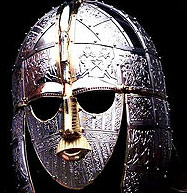You used to have 'Apartheid regime'.
A racist society once existed at the beginning of the Anglo-Saxon era in Britain, researchers speculate. According to them, a small population of migrants from Germany, the Netherlands and Denmark created this distinguished society when they arrived in the fog island nation.
 Anglo-Saxon treasures show that they are an economic force. (Photo: BBC) Researchers believe that immigrants have changed the genome of the local population by using economic advantages to spread to the native population. This may explain the abundant occurrence of German genes in British men today.
Anglo-Saxon treasures show that they are an economic force. (Photo: BBC) Researchers believe that immigrants have changed the genome of the local population by using economic advantages to spread to the native population. This may explain the abundant occurrence of German genes in British men today.
Studies reveal the genetic resources of the British population today containing 50 to 100% of the German Y chromosome.
But this dominance has embarrassed experts because some historical and archaeological evidence only shows a relatively small number of Anglo-Saxon immigrants (about 10,000 to 20,000 people) to the UK in the middle of the 5th century. -7 AD, compared to about 2 million indigenous people.
To understand what happened during that period, British scientists used computers to model genetic changes when there was a small group of immigrants.
They also use historical evidence to suggest that indigenous British people were at a disadvantage in social and economic terms compared to Anglo-Saxon immigrants. This, according to them, may have led to an imbalance in reproduction, causing ethnic division.
Dr. Mark Thomas, an author of the study from the University of London, said: "We found that the Anglo-Saxons spread the culture and genome into native English in just a few hundred years. ".
"A small part of Anglo-Saxon immigrants may have quickly established their status by having more children live to grow up, thanks to military power and economic superiority," Thomas said. .
"We believe that they also prevent native British genomes from spreading into their populations by limiting inter-racial marriages in an Apartheid system. That's what we see today - a populations with the majority of German genetic resources, speaking German as the main language.
T. An
- Over 31 billion VND protects Tram Chim National Park
- Amazon's freshwater ecosystem is sensitive to environmental degradation
- Cure diabetes according to traditional medicine
- Potala Palace
- Trust helps extend life
- AOL released a security application
- Companies with the strangest welfare regime in the world
- The feudal era of Chinese competition
- Is daily shampoo good?
- Pandas pretend to be pregnant for better care
- 12 surprises about pirates
- Half a liter of beer a day is healthy
 Discovered an ancient centipede fossil 99 million years old
Discovered an ancient centipede fossil 99 million years old Discovered bat-like dinosaurs in China
Discovered bat-like dinosaurs in China Discovered a 200-year-old bronze cannon of the coast
Discovered a 200-year-old bronze cannon of the coast Discover 305 million-year-old spider fossils
Discover 305 million-year-old spider fossils